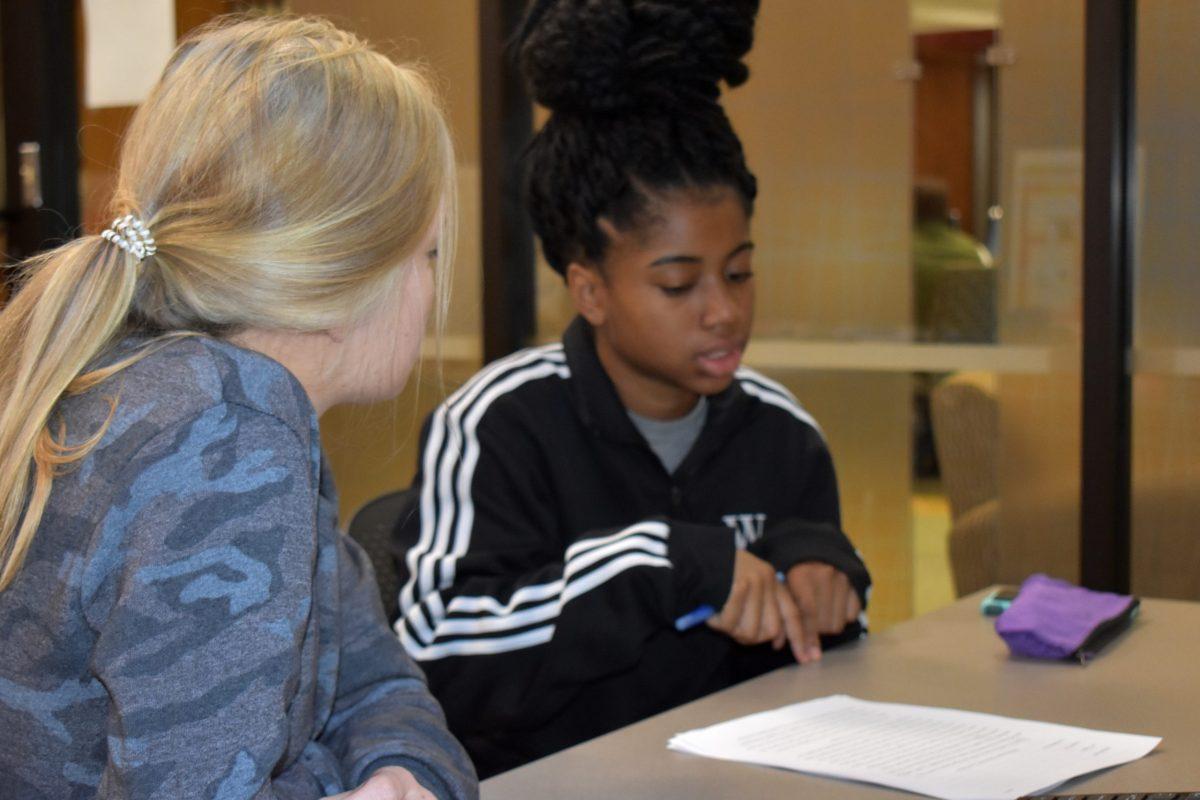Wofford’s writing center can help you with your writing
Tucked in a glass-enclosed pocket on the main floor of the Sandor Teszler Library is, or what has the potential to be, one of Wofford’s greatest resources: the Writing Center.
The Writing Center is organized and directed by Dr. Deno Trakas, Professor of American Literature at Wofford. The Center’s daily operations, however, are managed and implemented by Wofford students.
Writing Center tutors, nine of whom staff the center this semester, are selected from any major field, not just English. Tutors range in class from sophomores to seniors and are hired based on their interest, professor recommendations, ability to communicate with students and knowledge of all of the elements of writing.
The role of the Writing Center tutors is not, as the center’s website says, “to proofread or ‘fix’ papers before they’re turned in.” The notion of “fixing” papers is a common misconception among students who bring their work to the Writing Center; instead of seeking constructive criticism and guidance, some students hope to hand over their papers to an “expert” who will make all of the necessary changes and give the paper a stamp of approval. That is not the role of the Writing Center.
Instead, the goal of the Writing Center, as stated on its website, is to provide assistance, support and offer guidance on “all aspects of writing, including generating ideas, determining audience and purpose, organizing ideas, providing evidence to support arguments, documenting sources and editing for grammar, punctuation and spelling.” Writing Center tutors are trained do exactly these things.
Senior tutor Kathleen Hughes, an English and Philosophy double major, said of her role, “As a tutor, I work with students to help improve their papers, whether that be through editing grammar or talking about the larger structure of their argument. A lot of students come to the writing center concerned about the grammar in their paper. I always try to explain the significance behind the grammar rule if someone is struggling to remember its function.”
Explaining the method behind the madness, i.e. the reasons behind the rules of grammar, is one of the key factors in the usefulness of Writing Center tutors. Like teachers in English, tutors aim not just to correct what is wrong, but to explain why certain grammatical errors are, in fact, erroneous. The goal is to point out what’s good in a paper, what’s not so good and how the not-so-good might be improved. Writing Center tutors do not fix papers, but rather, give suggestions for students to revise their own papers.
Junior tutor Shannon McGrath said of this approach to tutoring, “This helps students in the long run, as they can learn different techniques in the writing center and refrain from making the same mistakes on papers.”
That being said, even Writing Center tutors are not the ultimate source of wisdom. In fact, they are encouraged to emphasize to students that, while tutors make suggestions, the student has to determine what he or she believes to be most appropriate for his or her paper, after having taken the tutor’s suggestions into account.
When asked why he decided to become a Writing Center tutor, sophomore Blake Kirsch said, “In high school I had an English teacher named Miss Hames. That teacher pushed me very hard to work on my grammar and all of my writing and on my reading skills. She taught me in a way that was straightforward and kind and she did not make me feel bad when I did not know how to do something.” Like Kirsch’s teacher, Writing Center tutors also aim to gently guide students to better composition skills by encouraging rather than embarrassing students. Writing Center tutors know that students who come to have their papers reviewed are serious about their studies and the tutors want to help.
Each week, the tutors and Trakas, their faculty advisor, meet as a group to discuss concerns they have come across in both tutoring sessions and their own writing projects. By reflecting on these two things, tutors begin to recognize and articulate repeated patterns in college writing, thus regularly expanding not only their knowledge of grammatical and stylistic conventions, but also their ability to generate, formulate and polish ideas within a paper.
The Writing Center is open Monday-Thursday 1-4 p.m. and 7-10 p.m., in addition to Friday afternoon from 1-4 p.m and Sunday evening from 7-10. The Writing Center is a walk-in service, but students who have particularly extensive papers or special concerns are encouraged to reach out to Dr. Trakas to schedule an appointment. For other questions or more information about the Writing Center, visit the center’s website, https://www.wofford.edu/library/writingcenter/, or contact Trakas or a Writing Center tutor (Chandler Compton, Meghan Daniel, Kathleen Hughes, Blake Kirsch, Shannon McGrath, Nat McMaster, Daniela Samaniego-Gonzalez, Hugo Stack and Elizabeth Terrell).
Photo Caption: Writing Center tutors work with individuals to help them not only improve their papers but learn about grammatical and stylistic conventions that will help them in future writing assignments.



































